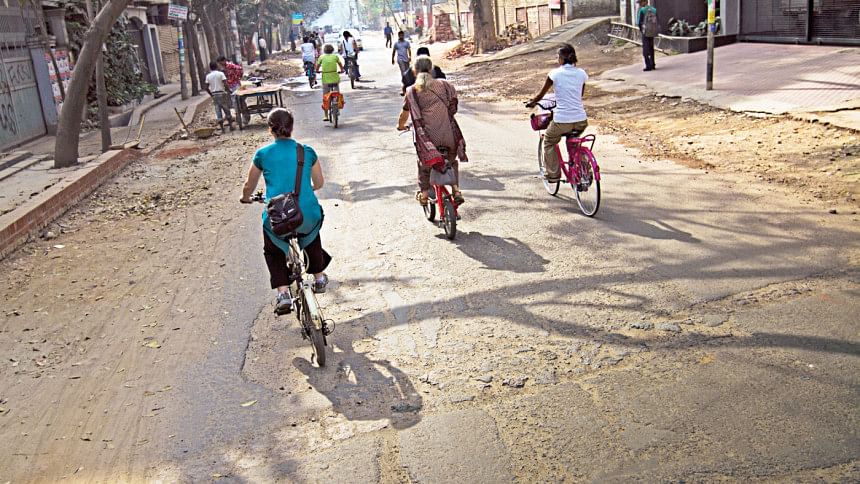Bicycles against traffic

If you ask anyone what would be a defining trait of Dhaka, the notorious traffic congestion might be one of the answers.
However, in recent years, a growing number of individuals -- from students to professionals -- are mounting their bicycles, not just for the thrill of a morning ride but as a committed choice for their daily commutes.
This shift is driven by necessity and aspiration, as Dhakaites seek to navigate the city's traffic gridlocks, reduce their carbon footprint, and embrace a healthier lifestyle.
MD Kaiser Hossain, director of communications and public pelations at H&H International Foundation and a member of BDCyclists, cycles routinely. Reminiscing about his early years, he shared, "In my school years, cycle was my primary mode of transportation."
Hossain notes a significant shift over the years. "After a gap of a couple of years, I started cycling again in 2013 and have been a member of the BDCyclists group since then. I cycle regularly; likewise, I have seen many office-goers use bicycles to navigate the city."
He also pointed out the differences between urban and rural cycling cultures, stressing the importance of encouraging cycling from a young age in the city.
He emphasised on the dual benefits of cycling for health and the environment. "In the rural areas of our country, you would see school children riding cycles to attend their classes. But in Dhaka, you rarely come across such a scenario. We should encourage our children to learn cycling from their early years."
BDCyclists is a community of cyclists in Bangladesh. It was initiated in 2011 by a group of enthusiasts and now works for the promotion of cycling amongst the masses. Despite the growing popularity of cycling, Dhaka's streets can often feel unwelcoming to cyclists.
Janifar Rahman, an employee at SOS Children's Village Dhaka, shares her personal experience: "I enjoy a sense of freedom whenever I ride my bicycle."
She finds cycling efficient for her commute from Mohammadpur to Mirpur but voices safety concerns. "However, my complaint is that the roads are not bicycle-friendly. Sometimes, I feel very scared whenever a truck or bus is behind me or overtakes me."

Safety concerns, stemming from the chaotic traffic and sometimes less-than-respectful attitudes towards cyclists from motor vehicle drivers, further complicate the decision to cycle. The fear of accidents, theft, and lack of emergency support mechanisms are tangible disadvantages that many cyclists face.
Despite these challenges, the experience of cycling in Dhaka is uniquely rewarding. Ask any regular commuter, and you will hear tales of exhilaration, of discovering hidden corners of the city, of mornings filled with the promise of a new adventure. There's a sense of reclaiming one's time and freedom, of being more in tune with the city's rhythms and one's own body.
Kazi Dhiman, a graphic designer, echoes the sentiment of efficiency. "My office used to be near the Beribandh. So, as I lived in Mirpur-1, I used my cycle to commute every day. It was a time-efficient option because if I had taken the local bus, it would have taken me hours to reach the office."
In Dhaka, cycling, with its blend of advantages and disadvantages, is more than an easy option for commuting -- it's a conscious approach to embracing sustainability and a commitment to a healthier life. The challenges are real, but so are the opportunities for transformation.
As more Dhakaites turn to bicycles, the narrative of the city's commute is slowly but surely changing, paving the way for a greener, healthier Dhaka.

 For all latest news, follow The Daily Star's Google News channel.
For all latest news, follow The Daily Star's Google News channel. 



Comments